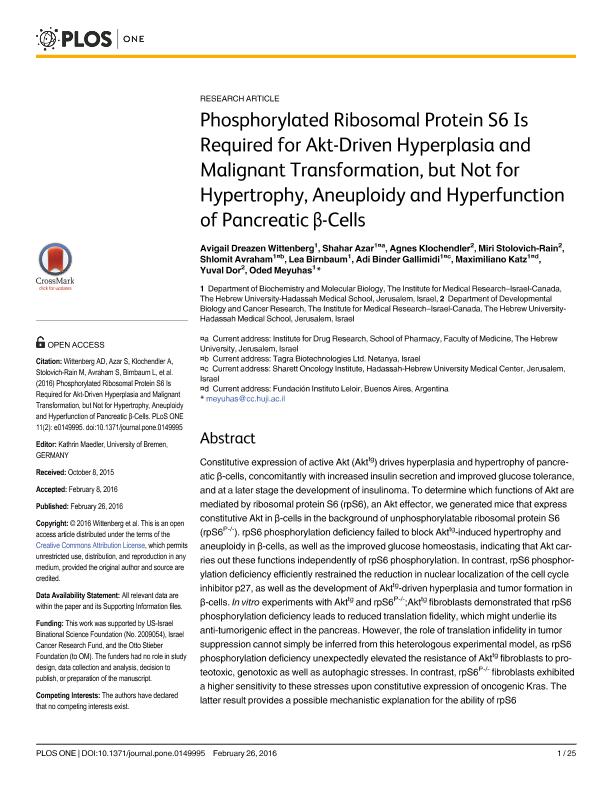Artículo
Phosphorylated Ribosomal Protein S6 Is Required for Akt-Driven Hyperplasia and Malignant Transformation, but Not for Hypertrophy, Aneuploidy and Hyperfunction of Pancreatic β-Cells
Wittenberg, Avigail Dreazen; Azar, Shahar; Klochendler, Agnes; Stolovich-Rain, Miri; Avraham, Shlomit; Birnbaum, Lea; Binder Gallimidi, Adi; Katz, Maximiliano Javier ; Dor, Yuval; Meyuhas, Oded
; Dor, Yuval; Meyuhas, Oded
 ; Dor, Yuval; Meyuhas, Oded
; Dor, Yuval; Meyuhas, Oded
Fecha de publicación:
02/2016
Editorial:
Public Library Of Science
Revista:
Plos One
e-ISSN:
1932-6203
Idioma:
Inglés
Tipo de recurso:
Artículo publicado
Clasificación temática:
Resumen
Constitutive expression of active Akt (Akttg) drives hyperplasia and hypertrophy of pancreatic β-cells, concomitantly with increased insulin secretion and improved glucose tolerance, and at a later stage the development of insulinoma. To determine which functions of Akt are mediated by ribosomal protein S6 (rpS6), an Akt effector, we generated mice that express constitutive Akt in β-cells in the background of unphosphorylatable ribosomal protein S6 (rpS6P-/-). rpS6 phosphorylation deficiency failed to block Akttg-induced hypertrophy and aneuploidy in β-cells, as well as the improved glucose homeostasis, indicating that Akt carries out these functions independently of rpS6 phosphorylation. In contrast, rpS6 phosphorylation deficiency efficiently restrained the reduction in nuclear localization of the cell cycle inhibitor p27, as well as the development of Akttg-driven hyperplasia and tumor formation in β-cells. In vitro experiments with Akttg and rpS6P-/-;Akttg fibroblasts demonstrated that rpS6 phosphorylation deficiency leads to reduced translation fidelity, which might underlie its anti-tumorigenic effect in the pancreas. However, the role of translation infidelity in tumor suppression cannot simply be inferred from this heterologous experimental model, as rpS6 phosphorylation deficiency unexpectedly elevated the resistance of Akttg fibroblasts to proteotoxic, genotoxic as well as autophagic stresses. In contrast, rpS6P-/- fibroblasts exhibited a higher sensitivity to these stresses upon constitutive expression of oncogenic Kras. The latter result provides a possible mechanistic explanation for the ability of rpS6 phosphorylation deficiency to enhance DNA damage and protect mice from Kras-induced neoplastic transformation in the exocrine pancreas. We propose that Akt1 and Kras exert their oncogenic properties through distinct mechanisms, even though both show addiction to rpS6 phosphorylation.
Palabras clave:
Rps6
Archivos asociados
Licencia
Identificadores
Colecciones
Articulos(IIBBA)
Articulos de INST.DE INVEST.BIOQUIMICAS DE BS.AS(I)
Articulos de INST.DE INVEST.BIOQUIMICAS DE BS.AS(I)
Citación
Wittenberg, Avigail Dreazen; Azar, Shahar; Klochendler, Agnes; Stolovich-Rain, Miri; Avraham, Shlomit; et al.; Phosphorylated Ribosomal Protein S6 Is Required for Akt-Driven Hyperplasia and Malignant Transformation, but Not for Hypertrophy, Aneuploidy and Hyperfunction of Pancreatic β-Cells; Public Library Of Science; Plos One; 11; 2; 2-2016; 1-25; e0149995
Compartir
Altmétricas



